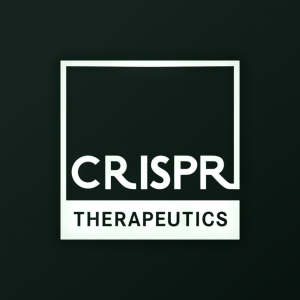CRISPR Therapeutics Presents Data at the 2024 American Society of Hematology (ASH) Annual Meeting
Rhea-AI Summary
CRISPR Therapeutics presented data from their Phase 1/2 clinical trial of CTX112™, a next-generation CD19 allogeneic CAR T cell therapy, showing promising results in treating relapsed or refractory B-cell malignancies. The FDA granted Regenerative Medicine Advanced Therapy (RMAT) designation to CTX112 for treating R/R follicular lymphoma and marginal zone lymphoma.
Key findings include:
- 67% objective response rate across all dose levels
- 50% complete response rate
- Well-tolerated safety profile with no Grade ≥3 infections
- Five patients achieved responses lasting over 6 months
The trial involved 12 subjects treated with varying doses, demonstrating dose-dependent efficacy. CTX112 is also being tested in a Phase 1 trial for systemic lupus erythematosus, with potential expansion into other autoimmune indications. A broader update across indications is expected in mid-2025.
Positive
- FDA granted RMAT designation for CTX112, potentially expediting development and review
- 67% objective response rate and 50% complete response rate across all dose levels
- Five patients achieved responses lasting over 6 months
- Well-tolerated safety profile with no Grade ≥3 infections or GvHD
- Demonstrated 7-fold higher peak concentration and 9.7-fold higher mean area under the curve compared to CTX110
Negative
- Early-stage trial with patient data (only 12 subjects)
- Long-term durability of response still needs to be established
News Market Reaction
On the day this news was published, CRSP declined 4.76%, reflecting a moderate negative market reaction.
Data tracked by StockTitan Argus on the day of publication.
-Preliminary data demonstrate that CTX112™ has the potential to provide meaningful clinical benefit with a well-tolerated safety profile using a standard lymphodepletion protocol-
-Company announced that the U.S. Food and Drug Administration (FDA) granted Regenerative Medicine Advanced Therapy (RMAT) designation to CTX112 for the treatment of certain relapsed or refractory (R/R) CD19-positive B-cell malignancies-
-CTX112 is also in a Phase 1 clinical trial in systemic lupus erythematosus (SLE), with the potential to expand into additional autoimmune indications in the future-
-Company expects to provide a broader update across oncology and autoimmune indications in mid-2025-
ZUG, Switzerland and BOSTON, Dec. 09, 2024 (GLOBE NEWSWIRE) -- CRISPR Therapeutics (Nasdaq: CRSP), a biopharmaceutical company focused on creating transformative gene-based medicines for serious diseases, today presented data from the Company’s ongoing Phase 1/2 dose escalation clinical trial evaluating the safety and efficacy of CTX112™, a next-generation CD19 allogeneic CAR T cell therapy, in relapsed or refractory (R/R) CD19-positive B-cell malignancies at the 2024 American Society of Hematology (ASH) Annual Meeting. Additionally, the Company announced that the U.S. Food and Drug Administration (FDA) granted Regenerative Medicine Advanced Therapy (RMAT) designation to CTX112 for the treatment of R/R follicular lymphoma and marginal zone lymphoma.
“We are excited by these encouraging results on safety and efficacy for CTX112, which demonstrate the potential of an allogeneic CAR T treatment to produce complete remissions in heavily pre-treated patients,” said Naimish Patel, M.D., Chief Medical Officer of CRISPR Therapeutics. “The data support a well-tolerated safety profile and the possibility to address the unmet need in this patient population with an off-the-shelf CAR T therapy. These results also support the potential treatment of certain autoimmune diseases by CTX112, and we are continuing to advance our SLE trial. We would like to extend our deepest gratitude to the patients, their families, and the investigators who have participated in our clinical trials. Their dedication and contributions are invaluable to advancing our programs and bringing us closer to potentially innovative treatments.”
“We are very encouraged by the progress and early clinical data from CTX112, which could result in better outcomes for patients,” said Armin Ghobadi, M.D., Professor of Medicine and Clinical Director, Center for Gene and Cellular Immunotherapy (CGCI), at Washington University School of Medicine. “CTX112 has shown dose-dependent efficacy and response rates that are comparable to the early autologous CAR T trials. These early results highlight the potential for CTX112 to emerge as an effective, off-the-shelf CAR T therapy for patients with relapsed or refractory CD19-positive B-cell malignancies.”
CTX112 Trial Overview
The Phase 1/2 clinical trial is an open-label, multicenter study evaluating the safety and efficacy of CTX112 in relapsed or refractory (R/R) B-cell malignancies. Eligible disease subtypes include large B-cell lymphoma (LBCL), follicular lymphoma (FL) grade 1-3a, marginal zone lymphoma (MZL), and mantle cell lymphoma (MCL). CTX112 was infused after a standard course of lymphodepleting chemotherapy (3 days of 30 mg/m2 fludarabine and 500 mg/m2 cyclophosphamide).
Data were presented from 12 subjects treated during the dose escalation with CTX112 doses ranging from 30 x 106 (Dose Level [DL] 1) to 600 x 106 (DL4) CAR+ T cells. The study population was enriched for patients with high-risk characteristics, including: 1) primary refractory disease or early relapse to first-line therapy (
Safety
CTX112 was well tolerated across all dose levels. The adverse events of interest are shown in the table below.
- There were no reported dose limiting toxicities (DLTs) and no reported Grade ≥3 infections. All grade 3 or 4 cytopenias (i.e., neutropenia, thrombocytopenia, anemia) following lymphodepleting chemotherapy resolved to Grade 2 or better within 1 month of CTX112 infusion. There were no reported cases of Graft versus Host Disease (GvHD),
- All cases of cytokine release syndrome (CRS) and immune effector cell-associated neurotoxicity syndrome (ICANS) were Grade 1 or 2 per the American Society for Transplantation and Cellular Therapy (ASTCT) criteria. These low-grade CRS and ICANS events followed standard toxicity management protocols.
Table 1. Summary of Adverse Events of Interest
| Cell dose (CAR+ T cells) | DL1 30x106 N=3 | DL2 100x106 N=3 | DL3 300x106 N=3 | DL4 600x106 N=3 | Total N=12 | |||||
| Gr1-2 | Gr ≥3 | Gr1-2 | Gr ≥3 | Gr1-2 | Gr ≥3 | Gr1-2 | Gr ≥3 | Gr1-2 | Gr ≥3 | |
| CRS, n (%) | 1 (33) | 0 | 2 (67) | 0 | 1 (33) | 0 | 3 (100) | 0 | 7 (58) | 0 |
| ICANS, n (%) | 0 | 0 | 1 (33) | 0 | 1 (33) | 0 | 2 (67) | 0 | 4 (33) | 0 |
| Infections, n (%) | 1 (33) | 0 | 0 | 0 | 2 (67) | 0 | 2 (67) | 0 | 5 (42) | 0 |
Clinical Efficacy
CTX112 produced responses at all dose levels. Disease assessment was performed by investigator review according to the Lugano criteria.
Table 2. Summary of Clinical Efficacy
| Cell dose (CAR+ T cells) | DL1 30x106 N=3 | DL2 100x106 N=3 | DL3 300x106 N=3 | DL4 600x106 N=3 | Total N=12 |
| Objective Response Rate (ORR), n (%) | 2 (67) | 2 (67) | 2 (67) | 2 (67) | 8 (67) |
| Complete Response Rate (CRR), n (%) | 1 (33) | 2 (67) | 1 (33) | 2 (67) | 6 (50) |
| Partial Response Rate, n (%) | 1 (33) | 0 | 1 (33) | 0 | 2 (17) |
- Objective and complete responses were seen at all dose levels and in all treated NHL subtypes (i.e., FL, MZL, MCL and LBCL).
- Responses were also seen in patients with poor prognostic factors including primary refractory disease, early relapse, and high baseline tumor burden (e.g., SPD > 4000 mm2).
- Five patients (of the 12 treated) have achieved responses lasting for more than 6 months, including one patient whose 6-month response was confirmed after the data cut-off date. One patient treated at DL1 remains in complete remission over a year after initial CTX112 infusion. The clinical efficacy of CTX112 is supported by a clearly differentiated pharmacokinetic profile for an allogeneic CAR T cell therapy.
- The mean peak concentration and total exposure were significantly higher at DL3 and DL4 vs. DL1 and DL2. This dose dependence suggests the possibility of deeper and more durable responses as the trial moves from dose escalation to dose optimization.
- Comparing DL3, the addition of Regnase-1 and TGFβR2 edits results in 7-fold higher peak concentration (Cmax) and 9.7-fold higher mean area under the curve (AUC) for CTX112 relative to CTX110®. Furthermore, at DL4, both Cmax and AUC are showing significantly more consistent and predictable increases. This suggests that the novel CRISPR/Cas9 potency edits are leading to higher CAR T cell expansion and functional persistence without enhanced or increased lymphodepleting chemotherapy doses.
These preliminary data demonstrate that CTX112 has the potential to provide meaningful clinical benefit with a well-tolerated safety profile. Given the inherent difficulties of manufacturing a CAR T therapy from a patient’s own diseased cells, allogeneic cellular therapy approaches have greater potential to address the unmet need in this patient population. These promising findings underscore the potential of allogeneic cell therapies to offer a transformative option for patients, and we remain committed to advancing this innovative approach to address the significant unmet medical need in this area.
Regenerative Medicine Advanced Therapy (RMAT) Designation
Established under the 21st Century Cures Act, RMAT designation is a dedicated program designed to expedite the drug development and review processes for promising regenerative medicine pipeline products. A regenerative medicine therapy is eligible for RMAT designation if it is a cell therapy, therapeutic tissue engineering product, human cell and tissue product or any combination product of such therapies that is intended to treat, modify, reverse or cure a serious or life-threatening disease or condition, and preliminary clinical evidence indicates that the drug or therapy has the potential to address unmet medical needs for such disease or condition. Similar to Breakthrough Therapy designation, RMAT designation provides the benefits of intensive FDA guidance on efficient drug development, including the ability for early interactions with FDA to discuss surrogate or intermediate endpoints, potential ways to support accelerated approval and satisfy post-approval requirements, potential priority review of the biologics license application (BLA) and other opportunities to expedite development and review.
About CTX112
CTX112 is a next-generation, wholly-owned, allogeneic CAR T product candidate targeting Cluster of Differentiation 19, or CD19, which incorporates edits designed to evade the immune system, enhance CAR T potency and reduce CAR T exhaustion. CTX112 is being investigated in an ongoing clinical trial designed to assess safety and efficacy of the product candidate in adult patients with relapsed or refractory CD19-positive B-cell malignancies who have received at least two prior lines of therapy. In addition, CTX112 is being investigated in an ongoing clinical trial designed to assess safety and efficacy of the product candidate in adult patients with system lupus erythematosus.
About CRISPR Therapeutics
Since its inception over a decade ago, CRISPR Therapeutics has transformed from a research-stage company advancing programs in the field of gene editing, to a company that celebrated the historic approval of the first-ever CRISPR-based therapy in 2023 and has a diverse portfolio of product candidates across a broad range of disease areas including hemoglobinopathies, oncology, regenerative medicine, cardiovascular, autoimmune, and rare diseases. CRISPR Therapeutics advanced the first-ever CRISPR/Cas9 gene-edited therapy into the clinic in 2018 to investigate the treatment of sickle cell disease or transfusion-dependent beta thalassemia, and beginning in late 2023, CASGEVY™ (exagamglogene autotemcel [exa-cel]) was approved in some countries to treat eligible patients with either of those conditions. The Nobel Prize-winning CRISPR science has revolutionized biomedical research and represents a powerful, clinically validated approach with the potential to create a new class of potentially transformative medicines. To accelerate and expand its efforts, CRISPR Therapeutics has established strategic partnerships with leading companies including Bayer and Vertex Pharmaceuticals. CRISPR Therapeutics AG is headquartered in Zug, Switzerland, with its wholly-owned U.S. subsidiary, CRISPR Therapeutics, Inc., and R&D operations based in Boston, Massachusetts and San Francisco, California, and business offices in London, United Kingdom. To learn more, visit www.crisprtx.com.
CRISPR THERAPEUTICS® standard character mark and design logo, CTX110® and CTX112™ are trademarks and registered trademarks of CRISPR Therapeutics AG. The CASGEVY™ word mark and design are trademarks of Vertex Pharmaceuticals Incorporated. All other trademarks and registered trademarks are the property of their respective owners.
CRISPR Special Note Regarding Forward-Looking Statement
Statements contained in this press release regarding matters that are not historical facts are “forward-looking statements” within the meaning of the Private Securities Litigation Reform Act of 1995. Because such statements are subject to risks and uncertainties, actual results may differ materially from those expressed or implied by such forward-looking statements. Such statements include, but are not limited to, statements regarding any or all of the following: (i) CRISPR Therapeutics’ preclinical studies, clinical trials and pipeline products and programs, including, without limitation, manufacturing capabilities, status of such studies and trials, potential expansion into new indications and expectations regarding data, safety and efficacy generally; (ii) the clinical data being presented at the 2024 ASH Annual Meeting; (iii) discussions with regulatory authorities related to product candidates under development by CRISPR Therapeutics including, without limitation, expectations regarding the benefits of RMAT designation; and (iv) the therapeutic value, development, and commercial potential of gene editing technologies and therapies, including CRISPR/Cas9. Risks that contribute to the uncertain nature of the forward-looking statements include, without limitation, the risks and uncertainties discussed under the heading “Risk Factors” in its most recent annual report on Form 10-K and in any other subsequent filings made by CRISPR Therapeutics with the U.S. Securities and Exchange Commission. Existing and prospective investors are cautioned not to place undue reliance on these forward-looking statements, which speak only as of the date they are made. The Company disclaims any obligation or undertaking to update or revise any forward-looking statements contained in this press release other than to the extent required by law.
This press release discusses CRISPR/Cas9 gene editing investigational therapies and is not intended to convey conclusions about efficacy or safety as to those investigational therapies or uses of such investigational therapies. There is no guarantee that any investigational therapy will successfully complete clinical development or gain approval from applicable regulatory authorities.
Investor Contact:
Susan Kim
+1-617-307-7503
susan.kim@crisprtx.com
Media Contact:
Rachel Eides
+1-617-315-4167
rachel.eides@crisprtx.com







